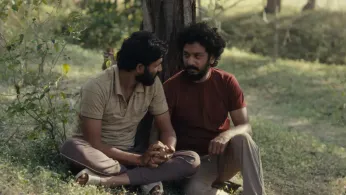
Oct 7
Tenderness Amid Thorns: "Cactus Pears" Reimagines Queer Romance in Rural India
READ TIME: 4 MIN.
At the 2025 Sundance Film Festival, a gentle but powerful new voice in queer cinema emerged with the premiere of "Cactus Pears" (original title: Sabar Bonda), directed and written by Rohan Parashuram Kanawade . Set in the rugged countryside of Western India, the film tells the story of Anand, a Mumbai call-center worker, who returns to his ancestral village to observe a ten-day mourning ritual for his deceased father. What begins as a somber homecoming soon unfolds into a passionate romance between Anand and his childhood friend, Balya, a local goat herder .
Anand's return is fraught with emotional landmines. At thirty years old, his unmarried status is both a disappointment and a cause for concern among his extended family, who are deeply entrenched in tradition. The pressure to conform to heteronormative expectations is palpable; Anand’s family has long shielded his sexuality from the community, fabricating a story of heartbreak with a woman to explain his bachelorhood . As Anand navigates the rituals of mourning, he is also forced to confront the suffocating love and judgment that have shaped his estrangement from home.
The film’s rural setting is not merely a backdrop but an active force—one that amplifies both the joy and the peril of Anand’s burgeoning relationship with Balya. Through wide-angle shots and immersive sound design, Kanawade draws viewers into a world where every glance and gesture carries weight, and where love itself is an act of quiet rebellion .
The romance between Anand and Balya is built on small, tender moments. In one pivotal scene, Balya gifts Anand a cactus pear, having painstakingly removed all the thorns. The gesture is at once literal and metaphorical: an offering of care and protection in a world that so often wounds queer people for simply being themselves . As their connection deepens, the film resists melodrama, instead favoring a slow-burn intimacy that feels both authentic and rare in mainstream portrayals of gay relationships .
Though the film culminates in a moment of physical and spiritual connection between the two men, critics have noted that to describe "Cactus Pears" solely as a gay romance would be reductive. The story is equally concerned with family, grief, and the possibility of joy in the aftermath of loss .
Upon its Sundance premiere, "Cactus Pears" received a standing ovation and was lauded by festival programmers as “a fresh take on queer themes in an unexpected setting, filled with compassion and warmth” . The film went on to win the Jury Prize at the festival and has since been featured at the Queer Screen Film Fest, where it was praised for its unflinching yet hopeful depiction of queer love in rural India .
Kanawade’s approach has been recognized for its refusal to sensationalize or stereotype. Instead, "Cactus Pears" offers a portrayal of LGBTQ+ lives that is deeply rooted in the specificities of Indian culture while resonating with universal themes of longing, belonging, and resilience. As the film continues its festival run, it has sparked important conversations about the representation of queer relationships in non-Western contexts, and the challenges faced by LGBTQ+ people in navigating family and tradition .
At the Sundance Q&A, Kanawade revealed that "Cactus Pears" is loosely inspired by true stories of queer isolation and resilience, as well as his own experiences growing up in rural India . The casting of Bhushaan Manoj and Suraaj Suman as Anand and Balya, respectively, has been widely praised for their understated performances that bring nuance and vulnerability to their roles .
The film’s visual and auditory design—marked by still frames and careful soundscapes—mirrors the internal worlds of its characters, juxtaposing the heaviness of grief with moments of levity and hope . This approach invites viewers to sit with the discomfort and beauty of the story, rather than rushing toward resolution or catharsis.
For many LGBTQ+ viewers, "Cactus Pears" represents a rare instance of seeing queer love depicted with both cultural specificity and emotional honesty. The film refrains from depicting queerness as a purely Western phenomenon, instead acknowledging the unique challenges and joys that come with living authentically in environments where tradition holds sway .
Critics and activists alike have highlighted the importance of films like "Cactus Pears" in expanding the global conversation about LGBTQ+ rights and representation. In a year marked by both progress and backlash against queer communities worldwide, the film’s success is a testament to the power of authentic storytelling in creating empathy and understanding across divides .
As "Cactus Pears" prepares for its wide release in November 2025 , the conversation it has started continues to grow. For director Rohan Kanawade, the film is only the beginning: “Stories like these are everywhere, waiting to be told,” he remarked at a recent screening. “If this film brings even one person hope, or helps a family see their loved one in a new light, then it has done its job” .
With its blend of artistry, compassion, and cultural insight, "Cactus Pears" stands as a landmark achievement not just for queer cinema, but for anyone interested in the power of love to transcend even the deepest-rooted thorns.






